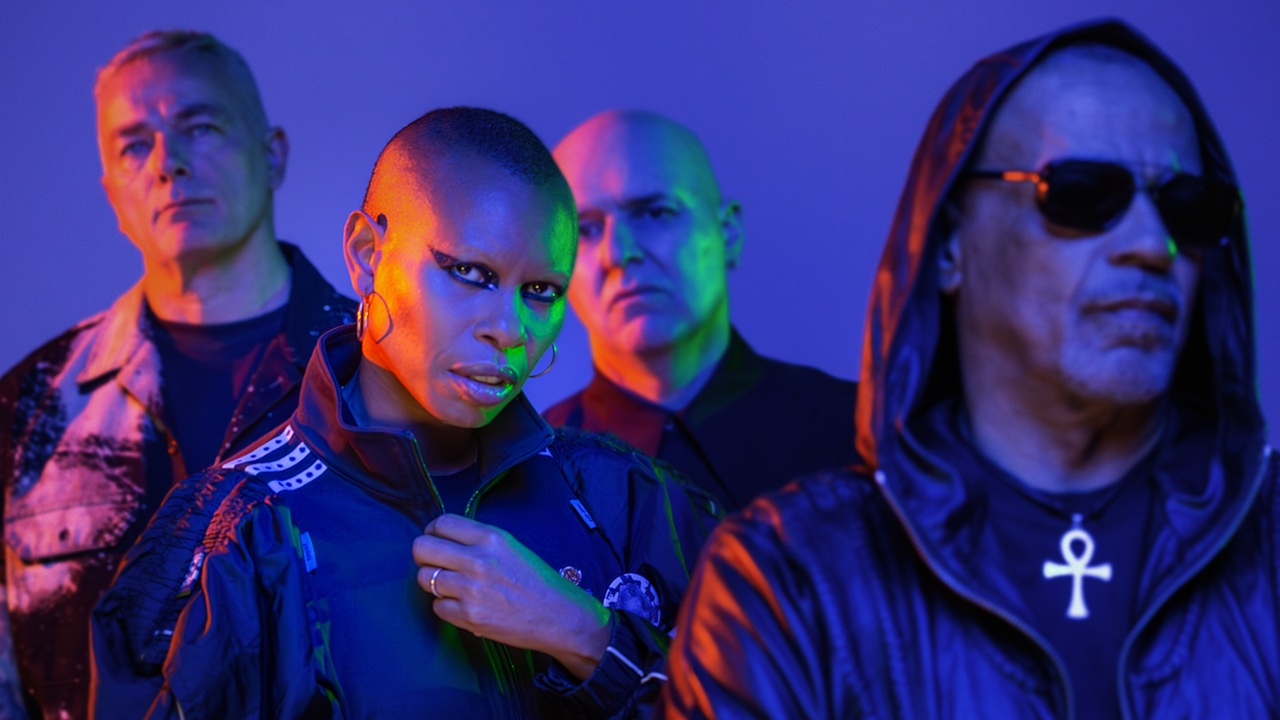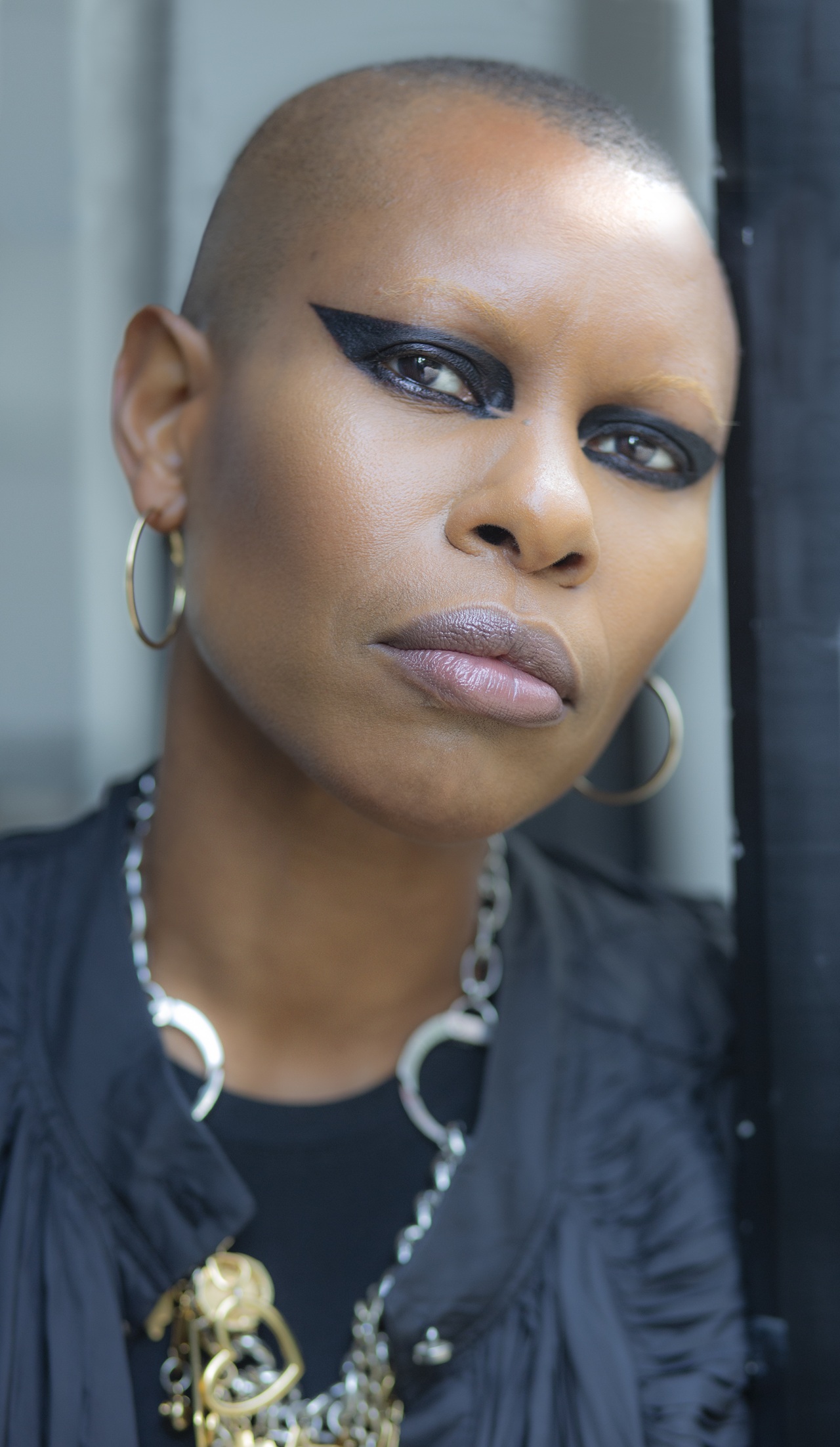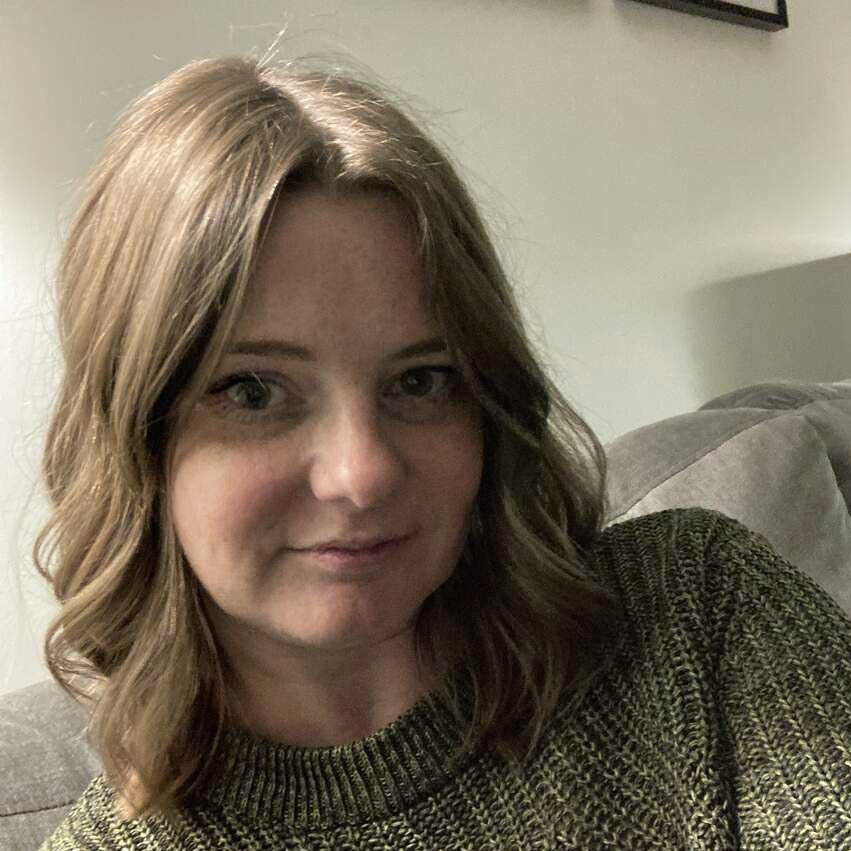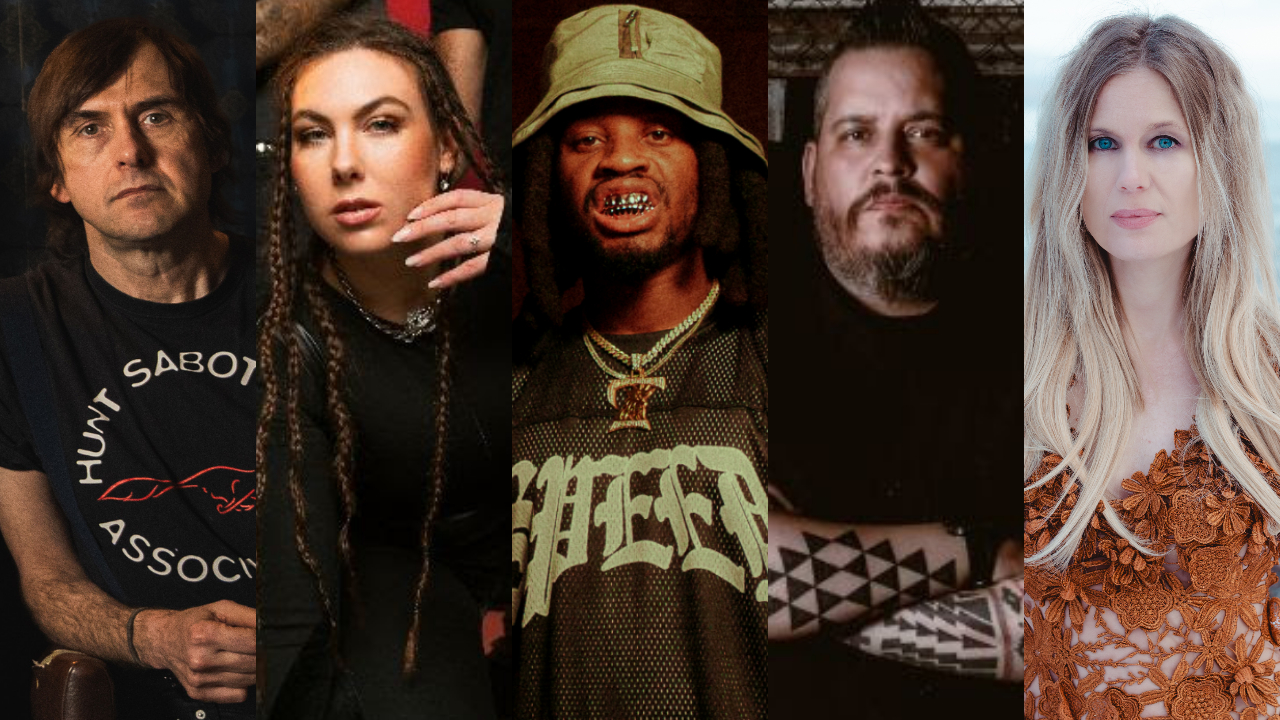"There was a lot of rejection, because I was a skinny Black girl trying to be the singer of a rock band." How Skunk Anansie's Skin went from Bob Marley-attended basement parties to a Glastonbury-headlining Britrock icon
From Oasis attending their early gigs to hanging out with David Bowie and Lemmy, Skin became a true rock icon in the 90s

Select the newsletters you’d like to receive. Then, add your email to sign up.
You are now subscribed
Your newsletter sign-up was successful
Want to add more newsletters?

Every Friday
Louder
Louder’s weekly newsletter is jam-packed with the team’s personal highlights from the last seven days, including features, breaking news, reviews and tons of juicy exclusives from the world of alternative music.

Every Friday
Classic Rock
The Classic Rock newsletter is an essential read for the discerning rock fan. Every week we bring you the news, reviews and the very best features and interviews from our extensive archive. Written by rock fans for rock fans.

Every Friday
Metal Hammer
For the last four decades Metal Hammer has been the world’s greatest metal magazine. Created by metalheads for metalheads, ‘Hammer takes you behind the scenes, closer to the action, and nearer to the bands that you love the most.

Every Friday
Prog
The Prog newsletter brings you the very best of Prog Magazine and our website, every Friday. We'll deliver you the very latest news from the Prog universe, informative features and archive material from Prog’s impressive vault.
In the UK in 1994, grunge was taking its final breaths, Britpop was making its lager-breathed presence felt in the mainstream, and the rock and metal scene was ready for something smarter, wilder and way more exciting.
Enter Skunk Anansie, a genuinely revolutionary force Hammer readers fell head over heels for. Early songs such as Yes It’s Fucking Political and Little Baby Swastikkka raged in on a wave of righteous, socially conscious punk energy, and, in frontwoman Skin, they had a ready-formed star, a born performer whose astonishing voice was matched only by her electric onstage charisma.
Their albums – three released before their 2001 split, three since they reformed in 2009, with a new one on the way – mix politics and social commentary with soulful confessionals. In 1999 they headlined Glastonbury – in a set that went off – making Skin the first Black British woman to do so.
They’ve toured with the likes of Rammstein and Killing Joke, been admired by luminaries such as David Bowie and Lemmy, and continue to defiantly follow their own path.
Now they’re back with An Artist Is An Artist, a furious takedown of social media negativity and the first single from their new album, The Painful Truth. Given the lightning speed with which the accompanying UK tour sold out, it’s clear their fans were ready and waiting for their return.
“We’re a bit of a people’s band,” says Skin, from her record company’s London office. “People identify with what we have to say and the way that we say it. There’s a lot of authenticity in our band. There’s no fakeness. People enjoy our gigs because we put everything into it. Maybe they just like great music. It can be as simple as that.”

You grew up in Brixton, and your grandfather had a nightclub in his basement. What was it like growing up in that environment?
Sign up below to get the latest from Metal Hammer, plus exclusive special offers, direct to your inbox!
“In the 60s, when a lot of Black people came over to England, most clubs wouldn’t allow a bunch of four Black guys into their club. They weren’t playing the kind of music that those guys wanted to hear anyway. So all around London, all these clubs started where it’d be a DJ with all the ska records and the bar in there. I remember sitting at the top of the stairs watching everybody dance.”
What kind of music did you hear there?
“I heard reggae and dub. The Beatles. Jamaicans love country and western, so Dolly Parton and Tammy Wynette, and Motown.”
Who came through the doors?
“I remember seeing a picture of me dancing with the guitarist from Bob Marley’s band [Peter Tosh]. Bob Marley used to go. Michael Manley, the prime minister of Jamaica. Muhammad Ali, when he was Cassius Clay, he used to go.”
Why were you living with your grandad?
“My dad was in the Air Force, so we lived in Air Force bases up and down the country. Then when I had to go to school, we moved to Brixton. My grandad had that base in Brixton, and he helped my mum buy a house.”
How did you first discover metal and rock?
“Top Of The Pops was this window to another world. I never missed it. I remember Boy George when he came on, and everyone was shocked because he had a dress on. I remember Shalamar with the breakdancing, and Prince singing Little Red Corvette, and this was my world.
And the whole ska thing – The Beat, The Selecter, all those bands, I loved that. When I was a bit older, I started listening to The Cure, and then I heard Led Zeppelin and it was all over.”
What was it about them that appealed?
“It was very complicated music, riffage, great vocals, sexy tunes, sexy band, and they were so different. It was a theme tune to Top Of The Pops, so that was the first rock song I got to know.”
You witnessed the Brixton riots in the 80s. What was that like?
“Brixton in those years was forgotten about, because Margaret Thatcher underfunded the Labour towns and cities, all the people that didn’t vote for her. And they brought in the sus law [‘suspected person law’], which meant you could be searched on suspicion.
Black people just got stopped all the time and searched in a very aggressive way, because they wanted you to retaliate and then they could be violent towards you, and then you’re thrown in prison. That meant that there was a lot of tension in Brixton.
My brothers were always getting stopped and searched, and people got fed up with it. That’s why there were riots. But I have fantastic memories of growing up in Brixton. I had an idyllic inner-city childhood, and we’d go to Jamaica for holidays. That was amazing. Yes, we were raised in poverty, but we did get to go to Jamaica. We did get to play and have a lot of freedom, even if we didn’t have any money. So for me, it was good times.”
What was your first band called, and what did they sound like?
“My first band was called JASS, which stood for ‘jazz and soul septet’, because there were seven of us. But we didn’t really do anything jazzy. We used to do covers of obscure indie songs, like Blind by Talking Heads. I was learning all these weird songs that I didn’t really know. It was terrifying, but it was fun.”
How did Skunk Anansie come together?
“I left my interior design job, and I met my manager, Leigh [Johnson], who introduced me to [songwriting partner] Len Arran. I’ve been writing songs since I was 13. The more we wrote songs, the more I wanted to be in a rock band, but that was a very difficult thing to do in the late 80s into the 90s – there were no lead singers that looked like me.
There was a lot of rejection, because I was a skinny Black girl trying to be the singer of a rock band. But then I found the Splash Club scene [in Kings Cross, London]. We had a lot of interest for [previous venture] the Mama Wild band, but it was too bluesy, it wasn’t modern, it wasn’t fresh, so I ended the band and started Skunk Anansie. Mama Wild got everything wrong, and then when we started Skunk Anansie, me and [bassist] Cass got everything right. We knew what we wanted to do and it blew up from there.”
What do you remember about that first gig at The Splash Club?
“It was mad. We were in a little scene at The Splash Club, which was started by [guitarist] Ace and his band at the time. I’d hang out with Ace a lot, I really liked him. I wanted him to be in my band.
We saw Oasis, Echobelly, a bunch of those bands. Record companies loved coming to that club. When we got together, the word got out that we were playing our first gig. Everybody came because I was the best singer, Ace was the best guitarist, Cass was the best bass player, and people liked our drummer at the time. He left because he didn’t think we were going to be successful with me singing!
The first gig was rammed. It was spectacular. And the next gig we did was full of A&R men, because we didn’t have any demos, so we just said, ‘If you’re interested, you’ve got to come down to see us live’, because we knew we could wow them. The beginning of Skunk Anansie, from first gig to being signed, was three gigs.”
Did you experience much homophobia when the band first broke through? Or do you think it’s worse now?
“Politically for queer people, it’s much better now. But at the same time, people are deliberately being homophobic. They’re doing it with knowledge, whereas back in the day, people were just a little bit ignorant. But it’s much easier to find your community and to get strength and support from that.
I’ve never come out, I don’t believe in it. I’m just myself. I don’t see any straight people coming out. It’s a ridiculous idea that at a certain point in our life we’ve got to tell people that we’re gay. And everyone just shouldn’t assume that everybody’s 100% straight.”
Your first release was Little Baby Swastikkka, a bold introduction to the band… [Sample lyric: ‘Who put the little baby Swastikkka on the wall?’]
“It was a different way to tell a story about the indoctrination of kids. I saw a little baby swastika halfway up a wall, it looked like it was done by little kids. A lot of those early songs were quite odd, but they just worked somehow, and they were very different to everything else that was going on. That was good for us, otherwise we would have got lumped in with Britpop.”
You didn’t fit in with it, did you?
“No, we weren’t part of it at all. We had a moment of wanting to be part of it, just because they were just sucking up all the press and TV shows and radio. So there was a bit of jealousy from afar. Within a year and a half, we were like, ‘No, don’t do that shit.’
It very quickly became a bloated, dead whale on the beach that was just rotting, while we were swimming our way to each country in Europe. Pulp, Blur, Oasis, Elastica… these were just great British bands. But then a lot of bands that were not very good jumped on a bandwagon.”
People look back on that time and think of it as such a blokey thing, but there were loads of women in bands. Your friendship with Garbage frontwoman Shirley Manson is one of the loveliest things on Instagram.
“I interviewed her for my show on Absolute Radio. She started off saying, ‘In the 90s, I had a bit of a beef with you, because I was always getting compared to you.’ I had no idea. They were always trying to tear her down by saying I was better than her. And she’s like, ‘Now, I realise it was so much harder for you.’
I mean, Garbage are massive in America. They did a fucking Bond theme [1999’s The World Is Not Enough], we were nowhere near the size that they were, and the way that people would try and knock her down is by comparing her to me. But yeah, me and Shirley love each other.”
What kind of person were you back then?
“I was very ambitious. The aim was to be in a rock band forever, like The Rolling Stones. It was all about climbing mountains. It was very stressful having that mentality, because you have your goals, but you’re not enjoying the process. It’s only when we stopped and then we reformed that I just enjoyed the climbing more than the goals, and that comes with maturity and age.”
You were good friends with Lemmy. What was he like?
“He was very gentle. He was the most authentic person I’ve met. He was who he was, and he wasn’t going to hide it. Also, he had absolutely the most perfect skin you’d ever imagine on a man, good baby skin. He was such a gentleman.
We were writing music together whenever I was in LA, and I had the sweetest messages from him. I remember one time I was supposed to write with him, and I couldn’t, because I’d had a break-up, and he just left me the loveliest, kindest thing: ‘I’m here for you. Come over to LA and we’ll hang out.’ He was a sweetheart.”
You coined the genre ‘clitrock’. What was that about?
“Clitrock was an accident. In the very beginning of our career, people were like, ‘What do you think about being a Britpop band?’ And I said, ‘Britpop? We’re Clitpop?’ It was a joke, but it became a whole thing. There’s a Clit Rock festival, which, of course, I give my blessing to. But it was just a sideways comment, I was just being cheeky.”
Who were your allies in the rock and metal scene?
“We played a lot with David Bowie. He was the ultimate inspiration. I loved him. I was nervous meeting him, because there are certain people who’re elevated beyond everybody else. But he was just a down-to-earth dude. And his wife Iman is as hugely iconic as he is, and she was a delight as well. The only people that I didn’t like were boybands. Five were fucking horrible. I think it’s because they didn’t have control, they didn’t write their songs, they were just puppets.”
What was the Rammstein tour like?
“Those guys are unbelievable live. They’d have the pyrotechnics and the fire was just beyond anything, and then they’d have these backstage parties where they played this really fast, Russian, cheesy pop. It was so funny that they love that kind of music.”
You released the song Yes It’s Fucking Political in 1996. Was it the big statement that it seemed?
“That song came out of people slagging us off because we’re political. My point was, everything’s political. It’s in everything we do, whether it’s clothes or the food that we eat. If you want to live in a world where you don’t talk about politics, that in itself is a political statement.”

Why did the split happen in 2001, and how did that affect you?
“We were just worn out. We had really overworked ourselves and hadn’t really taken care of ourselves. We didn’t even have an argument – we just stopped and went off and did a bit of solo musicianship.”
You’re based in the UK and in Brooklyn now. How’s life in the US post-election?
“That was the saddest day I’ve had in a very long time. Us lefties have got to stick together and not tear each other apart, because these people literally don’t want us to exist. Especially trans people. They’re trying to wipe trans people off the face of the Earth. And when they come for them, they come for all of us, they’re just first on the list. Next it’s diversity, it’s queer people, Black rights. But I’m in New York, and it’s like its own country. That counts for a lot, because otherwise I think it’d be very difficult to be there.”
You were awarded the OBE in 2021. What did that mean to you?
“It’s a weird thing, because I think that for Black people, there’s so much negativity around us accepting any award. But of course I wanted to accept it, it’s a great honour. It was a lovely thing to happen. It was a record of everything I’d done up to that point. And it made my mum really happy and proud. It’s not like Prince Charles even knew who I was. It’s a body of people that decide, and that body is extremely diverse.”
Do you think you paved the way for bands like Nova Twins?
“They supported us in their early days. It gets irritating for them to be compared to Skunk Anansie, because they’re nothing like us. They’re their own entity. I’m really happy that bands like that are getting through. But I’m not into the role model thing. I think athletes are great role models, because they really do have to be perfect and pure people. I’m an anti-role model.”
New album The Painful Truth is out May 23. Skunk Anansie's UK tour resumes May 14 at Great Escape Festival and the band play with The Smashing Pumpkins in August. For the full list of dates, visit their official website.
Emma has been writing about music for 25 years, and is a regular contributor to Classic Rock, Metal Hammer, Prog and Louder. During that time her words have also appeared in publications including Kerrang!, Melody Maker, Select, The Blues Magazine and many more. She is also a professional pedant and grammar nerd and has worked as a copy editor on everything from film titles through to high-end property magazines. In her spare time, when not at gigs, you’ll find her at her local stables hanging out with a bunch of extremely characterful horses.


